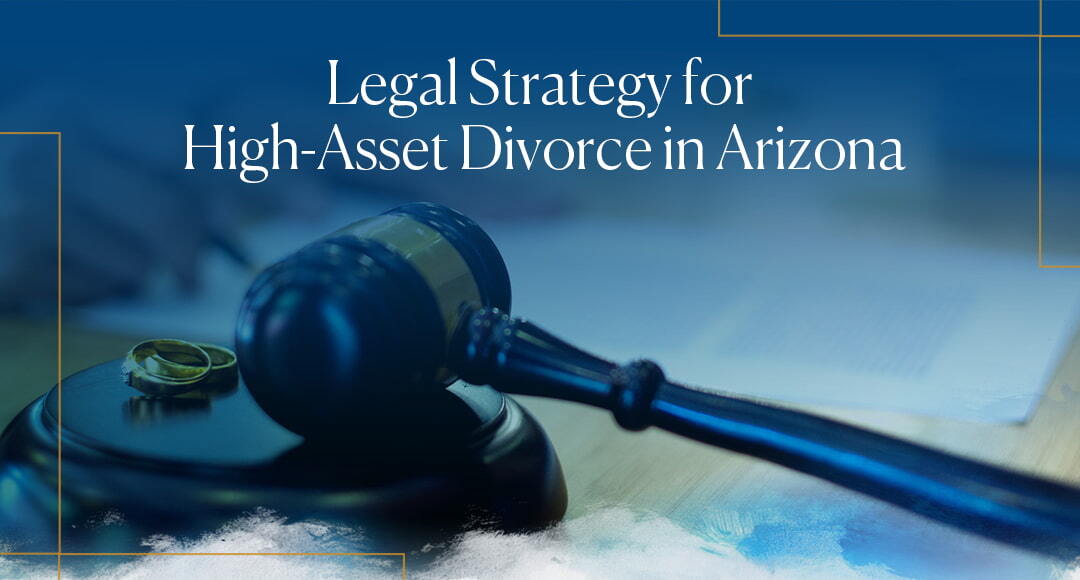
by John Schill | Sep 23, 2025 | Blog
Grandparents often play an important role in the lives of children, especially when one or both parents are absent. Grandparents may help with the upbringing of their grandchildren, and at times, they become the closest family members. Unfortunately, certain situations may lead to a lack of court-enforceable rights to see their grandchildren. Understanding how the courts handle grandparent visitation rights in Arizona can help make the right decisions.
Grandparent Visitation Rights in Arizona
As far as grandparent visitation rights are concerned, the Arizona Family Court prioritizes the best interests of the children. In most cases, this usually means prioritizing the rights of the legal parents, which could be either biological or adoptive. However, grandparents can petition the court for visitation rights with a grandchild. The court may grant them the petition if it finds that the visitation would be in the best interests of the child. Some of the situations that may lead to this outcome include:
- One of the child’s parents is deceased or has been missing for three or more months.
- The child’s parents have been divorced for three or more months.
- The child’s parents are unmarried, and the child was born out of wedlock.
- The grandparent has served in loco parentis, and the child’s parents are divorced or have a legal separation case pending.
In making the decision, the court must find that the grandparents’ visitation would be in the best interests of the child. The key factors that the court considers before making this determination include:
- The relationship between the child and the grandparent in the past
- The motivations of the parent who is denying visitation to the grandparent
- The motivation of the grandparent for seeking visitation rights
- The amount of visitation time being requested
- Potential negative impact that the visitation time might have on the child’s regular activities
- Whether there is a benefit to maintaining a relationship between the child and his or her extended family when a parent is deceased
Generally, grandparents who are unable to see their grandchildren in Arizona can petition the court for visitation. The petition, which is known as Grandparent Rights or Third Party Rights, can result in the courts providing temporary orders for the grandparents to visit their grandchildren.
Temporary Orders for Grandparents’ Visitation in Arizona
There is usually a need for temporary orders for grandparents’ visitations due to family dynamics. In many families, the grandparents tend to develop special relationships with their children. When a parent prevents the grandchildren from seeing the grandparent, it can have negative impacts on both the child and the grandparent.
Once the court has determined that granting visitation rights to a grandparent is appropriate, then the visitation times will be ordered. This will happen when the child visits the parent, that is, the grandparent’s relative. In cases where the parent is deceased, the court orders may include visitation during the times the deceased parent would have had visitation with the child.
Among the issues that may arise is proving that the parents’ divorce or that a parent was deceased before the grandparent filed a petition for visitation. While this ought to be straightforward, it can become difficult if the parent who has custody of the child objects to the visitation petition by the grandparent. Such issues make it necessary to involve an experienced attorney to guide you through the process and increase the chances of a favorable outcome.
Get Legal Support from Schill Law Group
At Schill Law Group, we understand that getting child visitation rights can often be complicated. While in a perfect world, everything can be smooth with the grandparents having the chance to see their grandchildren at any time, it is often not the case. If you are struggling to navigate this issue or understand how Arizona courts handle visitation rights for grandparents, get in touch with us today. You can call us at (480) 680-7432 for a free consultation.

by John Schill | Sep 23, 2025 | Blog, Uncategorized
Going through a divorce can be one of the most overwhelming experiences for both the parents and their children. As a parent, you need to decide on a reasonable yet fair solution for the distribution of parenting time. Although many children prefer to stay in the same house with their parents, divorce tends to make this impractical. As a child, you may wonder, “how old do you have to be to decide which parent you want to live with?”
Can a Child Decide Which Parent to Live with?
Children may sometimes have to live with one of their parents rather than both due to divorce or matters related to child custody. When this happens, it can be confusing to the children, especially because a child does not have to be interviewed in an Arizona court. Even though the child may express which parent they want to live with, this aspect of the law makes it difficult for the courts to determine the child’s wishes. To prevent the child from this stressful situation, the court first determines if the child is of an appropriate age and level of maturity to testify.
Legal Age a Child Can Decide If Want to See a Parent
There’s no exact age at which a child’s opinion becomes crucial in Arizona law. However, teenagers are usually more considerate in making decisions as they can express themselves more distinctly. The older a child is, the more mature and experienced they are considered compared to younger kids.
Since there is no particular age that allows the child to decide the custodial preference in Arizona, judges make their judgment based on the specific circumstances of the case. In addition to the perceived maturity of the child, the judge may also consider:
- The wishes of the child to testify and whether they have assistance from a family law lawyer
- How the child will be affected psychologically by the decision
- The relevance of the child’s testimony for the judge to reach a final decision
When Can a Child Decide Which Parent to Live With
Judges in Arizona consider the issues that a child is likely to go through when declaring their choice in front of their parents. To protect the child, minors are usually not allowed to testify about their choices in open court. Instead, the minor can testify in the judge’s chamber, where they will not be influenced by either parent to tell another story. By providing a private and safe space, the child can also decide what they want according to their desires.
When testifying, a court reporter may be present to record the interview. However, the recordings may be kept private, and the decision of whether the judge can interview the child out of the courtroom is made by the parents. Other methods that the court can use to get a child’s opinion include getting a custody evaluator to interview the child and make a summary report of what the child decides. An attorney can also be used to represent only the interests of the child, in the same way as the lawyers of the parents do. The other method is to assign a guardian ad litem, which makes sure the rights of the minor are protected.
Get Legal Support from a Trusted Arizona Family Law Attorney
When it comes to divorce and separation, Can a child choose which parent to live with in Arizona?’ is one of the most commonly asked questions. Generally, a child may choose which parent they want to see or live with. However, this is usually not an easy matter and requires an approach that considers the child’s desires. To get a better understanding of this issue or solve an issue you may be having about family law, reach out to Schill Law Group. We are ready and available to help you make the right decision and follow the right legal procedures.

by John Schill | Sep 22, 2025 | Blog
High-asset divorce involves individuals who have accumulated significant wealth and assets during their marriage. Due to the value of their assets and lifestyle, the divorce tends to be complex. It can be challenging to decide how to divide the assets fairly, as well as determine child custody arrangements. This is why you may need expert legal advice to navigate such issues.
Why are High Asset Divorces in Arizona Complex?
All divorces involve two people who are married, but want to separate legally. However, the divorce process can be complex, depending on the complexity, time, and financial considerations involved. In an uncontested divorce, the process is fast and relatively easy. On the other hand, a contested divorce involves a longer process, which can at times be volatile.
In high asset divorce cases, several essential factors tend to come into play, including substantial amounts of money, property, and other assets. While issues such as property are simple and straightforward in uncontested divorce cases, they become complex in a contested divorce. Every detail now becomes important, with a comprehensive approach needed in accounting to determine how the assets will be fairly divided. If one spouse is the primary breadwinner, it becomes challenging to achieve a transparent and fair division of the assets.
Important Considerations in High-Asset Divorce
In a standard divorce, most decisions involve splitting the custody of children, and dividing assets such as the house, vehicles, and bank account. For a high-asset divorce, a lot more factors come into play. In addition to the issues involved in a standard divorce, you now have to make decisions regarding additional real estate, such as vacation homes, a second or third home, and even rental properties.
The divorce process involves the evaluation of any business interests you have invested in or are involved in. This could be stock shares, ownership percentages, and other business assets or holdings. The evaluation also covers your bank accounts and vehicles, as well as pension and personal items like artwork and jewelry. If any debt has been incurred in the marriage, it is also assessed and allotted. In addition, the issue of child custody and support can become complicated, especially when discussions about vacations and overseas travel are involved.
Dealing with Spousal Support in High-Asset Divorce
One of the key factors that needs to be settled during a high-asset divorce in Arizona is spousal support. This usually becomes an issue of contention when one or the other of the spouses is the primary breadwinner in the relationship. Therefore, it becomes unlikely that both spouses can leave the relationship with no support.
Due to the complications of a high-asset divorce, the major considerations include deciding who will pay, who will receive, and what type of spousal support to provide. Other factors that may need consideration include whether one spouse helped or supported the other through specialized schooling or in their career. The number of years the spouses have been together and the duration of the marriage are also major considerations.
Assets Not Divided During a High-Asset Divorce
With matters of property division, the most important truth is that no party involved in the divorce should attempt to hide assets from the other spouse or the court. From the onset of your case, your divorce attorney will advise you to be completely transparent. Attempting to hide assets is illegal, which can result in the level of perjury that is punishable by fines and potentially jail time.
Hire a Trusted Family Lawyer for Your High-Asset Divorce
Like any other issue associated with divorce and family law in Arizona, the court does not require you to have a lawyer to assist in your high-asset divorce. However, the complex nature of this type of divorce makes it necessary to have legal support. At Schill Law Group, we will help you understand what your case involves and develop a winning legal strategy for your high-asset divorce. Call us at (480) 680-7432 to get started.

by John Schill | Aug 25, 2025 | Blog
Divorce or separation cases can be overwhelming, but every parent wants the best for their children. Even if it can be hard for parents to get along after a divorce, they will need to co-parent their children. Parallel parenting allows both parents to be involved in the child’s life, even if they do not want to be involved with each other.
What Is Parallel Parenting?
When you divorce or separate from your spouse, you can either co-parent or parallel parent your children. In a co-parenting arrangement, you share parenting responsibilities with your ex as both of you work together to raise your children. You discuss issues related to your children and agree on a solution together, attend school events together, and maintain continuous communication with your ex.
In parallel parenting, however, each parent has specific responsibilities. You carry out the day-to-day activities without involving the other parent, and all actions depend on your parenting plan. This type of parenting can be a temporary strategy or even a long-term solution when the parents cannot get along. You can use the approach until you and your ex can work together more directly.
Simplified Parallel Parenting Definition
Parallel parenting is a type of shared parenting where the parents maintain their relationship with their children while interacting with each other as little as possible. This approach can be particularly useful when you and your ex are having trouble with a civil relationship. Since everything is outlined in the parenting plan, each parent carries out their responsibilities as expected.
With parallel parenting, each parent has their own parenting approach whenever they have the children with them. They do not attend the same appointments, functions, or child-related events. Instead, their communication is parallel, which means it occurs solely through text messages, email, or a co-parenting app.
In most cases, however, the parents agree on the major decisions about their children. This may include issues related to school, religion, and extracurricular activities. They then leave the logistics up to the person exercising their parenting time. You may also assign a particular area or decision to each parent to reduce the time you spend with your ex. In turn, parallel parenting offers the following benefits:
- Better family relationships
- Less conflict between homes
- Fewer emotional problems
- Fewer behavior problems
- Better school performance
- Higher self-esteem
- More predictability when communicating about parenting matters
Parallel Parenting Plan
Parallel parenting is made successful by having a plan in place. When creating a parenting plan, both parents must be as specific and detailed as possible. By being detailed, you ensure that communication and contact between the parents is minimized. The following are some of the most important issues to include in a parallel parenting plan:
- The start and end of each person’s parenting time
- Specific days of visits
- Responsibility for transportation
- A specific exchange time and place
- What happens in the event of cancellation or make-up times
- When each parent has decision-making power
Since parallel parenting aims to reduce contact as much as possible, the plan lays out when and where the children will be at all times. Many parents usually use a communication book to stay in touch with their children’s lives whenever they are with the other parent. This book travels with the child to every parent’s house, with the child handing it off to the parent who is taking the children. The parent who is taking the child then writes the date and initials it. In the case of babies and toddlers, the parallel parenting book should include:
- Sleeping and feeding times
- Successful soothing methods
- Accidents and injuries
- Potty training updates
- Developmental milestones
- Medical appointments, illnesses, and medicines
For older children, it may include:
- School progress and reports
- Behavior issues
- Social activities with friends
- School, religious, and extracurricular activities
- Bed, bath, and meal routines
Get Legal Guidance on Parallel Parenting
Parallel parenting makes it easier for ex-spouses who do not want contact with each other to still effectively parent their children. A family lawyer can help you with creating a parenting plan and ensuring your arrangement is successful. Get in touch with our attorneys today at Schill Law Group for proper legal guidance on how to approach this issue.

by John Schill | Aug 25, 2025 | Blog
When dealing with child custody and parenting time issues in Arizona, you can opt for mediation. The approach is not only efficient, but also saves you the time and cost you would have incurred in litigation. This article explains the use of mediation in child custody and when you may need to use this approach.
Importance of Mediating Child Custody in AZ
As a well-known and appreciated means of alternative dispute resolution, mediation plays an important role in child custody. The Arizona Rules of Family Law Procedures provide mediation for every family law case involving child custody or parenting time.
In child custody cases, mediation involves the inclusion of a third party who is known as the mediator. This party helps the parents communicate, negotiate, and resolve disputes about custody and visitation arrangements without litigation. This approach not only allows you to easily and quickly reach an agreement, but it is also cost-effective. In most family law cases that use the services of a professional mediator, it is less costly to resolve custody disputes than to litigate those issues. With the aim of helping the parties toward agreement, all disputed issues have the potential for being fully resolved.
Is Mediation Required for Child Custody
Although not a necessity, most parents report a good experience in reaching agreements through mediation. The mediation facilitates the conversation and ensures that both parents get a fair chance to express their concerns. It also becomes easier for them to explore potential solutions that focus on the best interests of the child.
Child custody mediators are well-trained and neutral professionals who guide families through structured negotiations in a confidential setting. The approach adopted is child-focused and non-adversarial, aimed at fostering cooperation and helping parents arrive at a legally binding parenting plan. This makes mediation particularly useful in high-conflict cases by allowing for a customized, child-centric resolution.
When is Mediation Necessary in Child Custody
Mediation can prove to be particularly useful in cases where custody or parenting time issues are more likely to be contentious in your divorce. It becomes a suitable alternative for narrowing issues before trial. Since it is less costly and time-consuming than going to court, working with a mediator in Arizona offers a more collaborative approach to resolving child custody issues. With a good divorce and custody attorney, you get to know what to ask for in child custody negotiations and advice on what the courts may find acceptable.
How Arizona Custody Mediation Happens
The process of mediation in Arizona requires that the parents meet with the mediator to discuss issues regarding custody and parenting time. Usually, the mediator conferences with both or either party before the mediation to ensure that it is appropriate for the couple. To get started, the parties may request private mediation or through the court’s conciliation services program.
To ensure your child custody mediation in Arizona is smooth and successful, you need to ask for the following:
- Confidentiality of all the matters discussed during the mediation.
- Help with narrowing the arising issues to facilitate compromise and settlement.
- Help with avoiding the stress, expense, and unpredictable nature of a contested trial.
- Help to maintain control of the terms and provisions of a parenting agreement.
- Help with achieving an accurate sense of the relative strength of your legal position.
- Support from a certified, impartial mediator.
- Opportunities to improve parental communication.
The mediation process aims at reaching an agreement between the two parties in an amicable manner. As such, there is no reporting on what went on during the session. Every aspect of the process is kept confidential, with the parties trusting that everything discussed during the sessions will not be divulged to anyone. In this regard, the parties’ attorneys are also not permitted to attend court-sponsored mediation.
Once the issues have been settled, the mediator writes them into an agreement that is signed by the parties. Then the attorneys of the parties review the agreement and can file a timely objection with the court if needed.
Get Legal Guidance on Child Custody Mediation
While child custody mediation in Arizona is simplified and allows parties to easily get into an agreement, an attorney plays an important role in the process. To learn more about the process and get proper legal advice, get in touch with our child custody lawyers at Schill Law Group.






